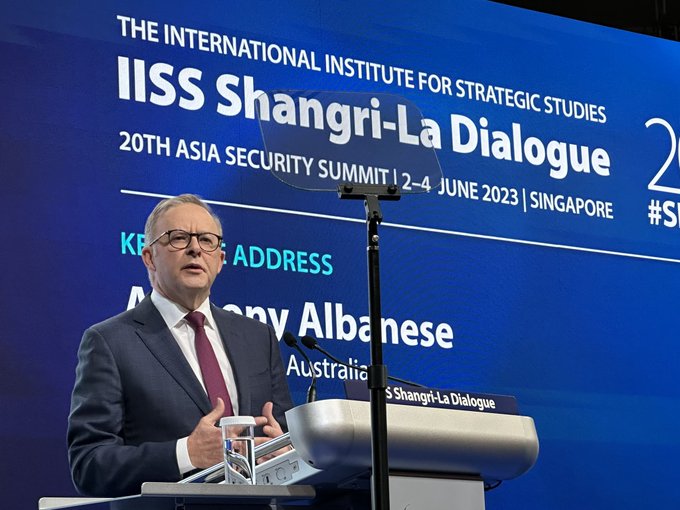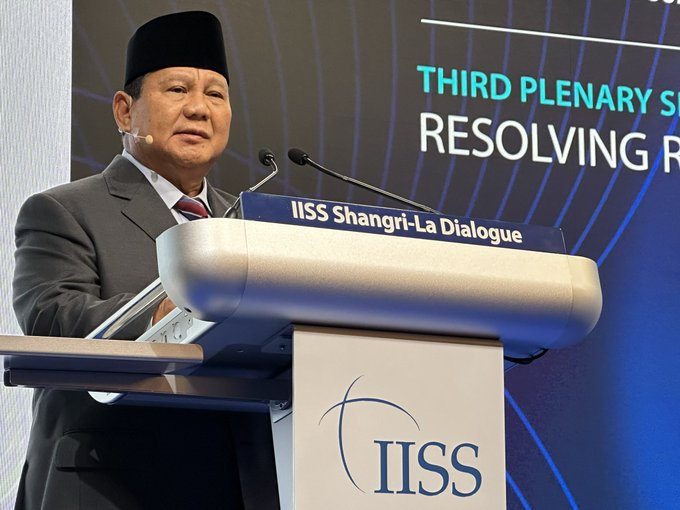
Singapore – Against the backdrop of a rapidly evolving geopolitical landscape, Singapore continued to host the 20th Shangri-La Dialogue on 2-4 June 2023, bringing together ministerial-level delegates, senior defense officials, and academics from 41 countries, including the United States Secretary of Defense Lloyd J. Austin III, Chinese State Councilor and Minister of National Defense General Li Shangfu, Indonesian Minister of Defense Prabowo Subianto, and ASEAN Secretary-General Dr. Kao Kim Hourn.
2023 is particularly nerve-wracking as the security summit began amid the lowest point of the relationship between the United States and China in decades and the continuing Russian invasion of Ukraine.
The Australian Prime Minister’s keynote address commenced the summit with a call out to the United States and China to establish reliable and open channels of communication, stressing that the diplomatic deep freeze only breeds suspicion and misunderstanding.
Sino-American tensions became evident at the summit as the U.S. Secretary of Defense Lloyd J. Austin III rebuked China for refusing to formally meet with the United States at the summit.
Beijing, on the contrary, advised Washington to act with sincerity and take concrete actions together with Beijing to stabilize the relations and prevent further deterioration, instead of hollowing out the long-standing ‘One China’ Policy and accusing one’s country of intensifying an arms race.
Meanwhile, European leaders sought to garner support for Ukraine from their Asian counterparts. Prime Minister of Estonia, Kaja Kallas, convinced the audience that Russia’s aggression against Ukraine is not only a European issue, but also a war against the fundamental principles of the UN Charter and international law. As an Asian counterpart, Indonesian Minister of Defense, General Prabowo Subianto, proposed a peace plan to end the war in Ukraine. Modeled after the Korean Peninsula, he proposed the withdrawal of 15 kilometers of each nation from their forward positions to establish a new demilitarized zone and an immediate ceasefire at the present positions of the conflicting parties.

He also proposed the formation and deployment of the United Nations monitoring and observer force in the new demilitarized zone and the execution of a referendum in what he called disputed territories, to ascertain the wish of the majority of the inhabitants.
Ukrainian Minister of Defense Oleksii Reznikov quickly dismissed the proposal, saying that Ukraine does not need a mediator coming to them with a strange, pro-Russia plan.
Prabowo’s proposal is not the first, but rather the continued effort of Indonesia in charting the Ukraine peace plan. Indonesian President Joko Widodo, who often goes by ‘Jokowi,’ visited Kyiv and Moscow a year ago to meet the two leaders. However, while being the first Asian leader to visit Ukraine after Russian aggression, Indonesia has been widely criticized by Western countries for refusing to impose sanctions on Moscow or to eminently condemn Moscow’s aggression against Kyiv.
The ‘strange move’ made by Prabowo reflects the huge support of the Indonesian public and many of its scholars toward Russia. Lina Alexandra, a senior researcher at the Center for Strategic and International Studies in Jakarta reiterated that the central goal of Indonesia’s efforts in mediating the Russo-Ukrainian conflict is to mitigate the adverse impacts of the war on the country and the rest of the world, rather than ending the war altogether.